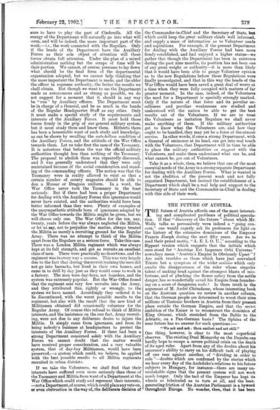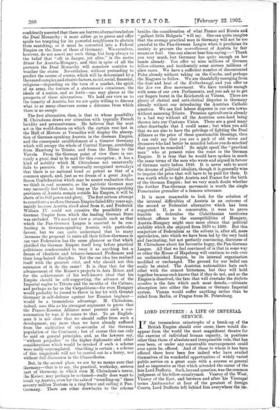THE IV .[URE OF AUSTRIA.
1111IE future of Austria affords one of the most interest- ". lag and complicated problems of political specula- tion. If that "discovery of the future" about which Mr. Wells talks so persuasively were indeed a "going con- cern," one would eagerly ask its professors for light on the history of the extensive dominions of the Emperor Francis Joseph during the next fifty years. Are we to read their proud motto, "A. E. I. 0. U.," according to the flippant version which suggests that the initials which once stood for " Austriae Est Imperare Orbi Universe" nowadays mean "Austria's Empire Is Obviously Upset " ? Are such troubles as those which have just convulsed Trieste but a symptom of the wider malaise which only awaits the disappearance of the ruler whose singulaz talent of making head against the strongest blasts of mis- fortune, and of plucking the flower safety from the nettle danger, has so wonderfully saved his Empire from founder- ing on a score of dangerous reefs ? Is there truth in the argument of M. Andrd Ch4radame, whose interesting book on the Austrian question we review in another column, that the German people are determined to wrest their nine millions of Teutonic brothers in Austria from their present place outside the German Empire, and that the secret ambition of the Kaiser is to reconstruct the dominion of King Ottocar, which stretched from the Baltic to the Adriatic, on a Pan-German basis ? The Sphinx of the near future has no answer for such questions :— "We ask and ask: thou smilest and art still."
One thing, however, is clear to the most superficial observer. The existing Dual Monarchy on the Danube can hardly hope to escape a severe political crisis on the death of its aged ruler. Apart from any of the doubts about his successor's ability to carry on his difficult task of playing off one race against another, of "dividing in order to rule "—doubts which are confirmed by the stories which we hear every day of the Archduke's relations to his future subjects in Hungary, for instance—there are many un- mistakable signs that the present system will not work much longer. Only the tact of the Emperor has kept its wheels so lubricated as to turn at all, and the heat- generating friction of the Austrian Parliament is a byword throughout Europe. No wonder, then, that it has been confidently asserted that there are but two alternatives before the Dual Monarchy : it must either go to pieces and offer spoils too tempting for its powerful neighbours to abstain from snatching, or it must be converted into a Federal Empire on the lines of those of Germany We ourselves, however, do not assert any such thing, but keep always to the belief that "oft in danger, yet alive," is the motto fittest for Austria-Hungary, and that in spite of all the portents the Dual Monarchy will somehow contrive to weather the storm. Nevertheless, without pretending to predict the course of events, which will be determined by a thousand complex and elusive factors, racial, social, financial, religious—depending on the turn of a market, the spirit of an army, the texture of a statesman's conscience, the ideals of a nation, and so forth—one may glance at the prospects of these alternatives. We hold our view as to the tenacity of Austria, but we are quite willing to discuss what to so many observers seems a dilemma from which there is no escape.
• The first alternative, then, is that to whose possibility M. Cheradame draws our attention with typically French lucidity and persuasiveness. He believes that the next act in the world-drama on which the curtain rose last in the Hall of Mirrors at Versailles will display the absorp- tion of German-speaking Austria in the German Empire, and the consequent establishment of a Greater Germany which will occupy the whole of Central Europe, stretching from Hamburg to Trieste, and from the Rhine to the Vistula. From the German point of view there is cer- tainly a great deal to be said for this conception ; it has a kind of nobility which M. Cheradame not unnaturally fails to perceive. It is universally recognised nowadays that there is no national bond so potent as that of a common speech, and, just as we dream of a great Anglo- Saxon Confederation which may be nearer realisation than we think in cool moments, so the patriotic German may very naturally feel that, so long as the German-speaking provinces of Austria remain outside his Empire, it will be shorn of its full power and glory. The first serious attempt to constitute a modern German Empire failed fifty years ago, mainly because Austria stood aloof from it, and Frederick William IV. could not conceive the possibility of a German Empire from which the leading German State was excluded. We need not view a crusade such as that which the Pan-German League is asserted to be con- ducting in German-speaking Austria with particular favour, but we can quite understand that to many Germans the proposal to unite all their fellow-Germans in Dne vast Federation has the same glamour as that which glorified the German Empire itself long before practical politicians condescended to treat it as anything but a dream of idealistic and tobacco-bemused Professors and their long-haired disciples. Yet the one idea has realised itself with the greatest éclat, and why should not this extension of it do the same? It is clear that for the advancement of the Kaiser's projects in Asia Minor, and for the achievement of his well-known ideal that his Empire should be self-supporting, the advance of the Imperial eagles to Trieste and the mouths of the Cattaro, and perhaps as far as the Carpathians—for even Hungary would probably be forced to throw in her lot with Greater Germany in self-defence against her Russian bugbear— would be a tremendous advantage. M. Chexadame, indeed, uses this as his strongest argument to prove that the Franco-Russian Alliance must prevent such a con- summation by war, if it comes to that. To an English- man it is not clear that we should suffer from such a development, any more than we have already suffered from the unification of six-sevenths of the German population of the Continent ; but of course this can only be said on general principles, and, as the lawyers say, "without prejudice" to the higher diplomatic and other considerations which would be invoked, if such a scheme were really contemplated. One thing is certain : a scheme of this magnitude will not be carried out in a hurry, nor without full discussion in the Chancelleries.
But, in the second place, we are by no means sure that Germany—that is to say, the practical, workaday, serious Dart of Germany, in which even M. Cheradame's terror, the Kaiser, may perhaps be reckoned—really does want to break up Austria, even for the sake of " rounding-up " these seventy million Teutons in a ring fence and calling it Pan- Germany. There are other drawbacks to the scheme besides the consideration of what France and Russia and "gallant little Bulgaria" will say. One can quite imagine that the average practical man in Germany will not be too grateful to the Pan-German League when it proclaims its anxiety to procure the morcellement of Austria by fair means or foul. One can almost hear him saying :—‘ Thank you very much, but Germany has quite enough on her hands already. You offer us nine millions of German fellow-citizens, and incidentally some sixteen millions of alien races. We have a sufficient number of discontented Poles already without taking on the Czechs, and perhaps the Magyars to follow. We are thankfully emerging from the dust and heat of the Kulturkampf, and you offer us the Los von, ROM, movement. We have trouble enough with some of our own Parliaments, and you ask us to get our fingers burnt in the Reichsrath at Vienna. There are plenty of clerical and anti-clerical disputes in Germany already without our introducing the Austrian Catholic question. We can find labour disputes in our own towns without annexing Trieste. Prussian agriculture is already in a bad way without all the Austrian corn-land being thrown into our Customs Union. There are a good many other drawbacks that I could name ; but when you add that we are also to have the privilege of fighting. the Dual Alliance as the price of these questionable blessings, then I can only say that you are a pack of old wives and dreamers who had better be muzzled before you do mischief that cannot be remedied.' So might speak the "practical man" who at present rules the roast in the German Empire. It is true that he would have spoken in much the same terms of the men who wrote and argued in favour of German unity before 1848. It is never safe to scout the dreams of political idealists, though it is generally wise to inquire the price that will have to be paid for them. It was worth while to fight Austria and France for the birth of the German Empire; but we very much doubt whether the further Pan-German movement is worth the single Pomeranian grenadier of a famous utterance.
It is more reasonable to look for the solution of the internal difficulties of Austria in an outcome of the second. or Federalist alternative which has been suggested. If, as is conceivable, it were to prove feasible to federalise the Cisleithanian territories without offence to the susceptibilities of Hungary, Austria-Hungary might once more obtain that political stability which she enjoyed from 1870 to 1890. But this conjecture of Federalism as the solvent is, after all, mere speculation, into which we have been led by the very lucid and fascinating, but not perfectly convincing, discourse of M. Cheradame about his favourite bogey, the Pan-German League. All that we feel convinced of is that in some way or other the House of Hapsburg will continue to rule over an undiminished Empire, be its internal organisation modified or unchanged. The ground for our belief can easily be stated. The Austrian nationalities hate each other with the utmost bitterness, but they will hold together because each knows that if they do not, and so the Empire is dissolved, the fate that will overtake the disfeeta membra is the fate which each most dreads,—ultimate absorption into either the Russian or German Imperial system. Vienna would suffer anything rather than be ruled from Berlin, or Prague from St. Petersburg.











































 Previous page
Previous page